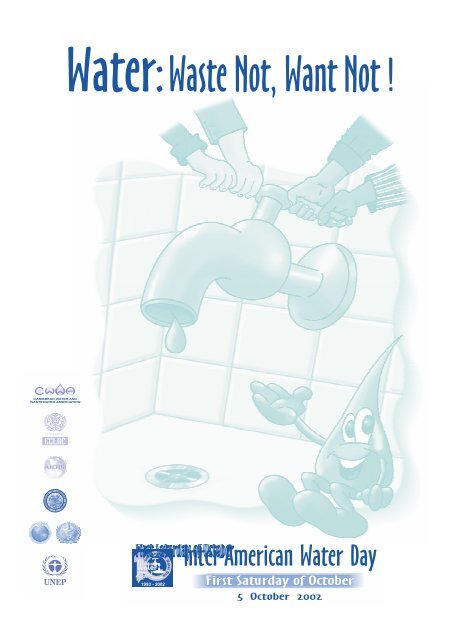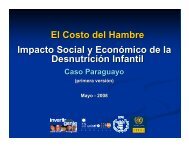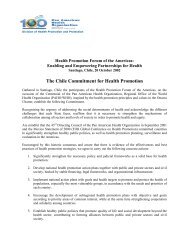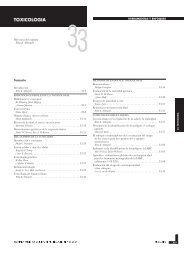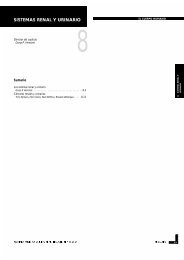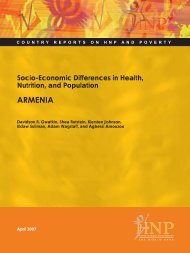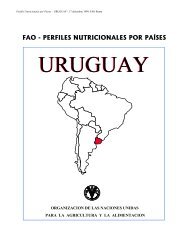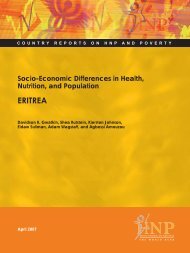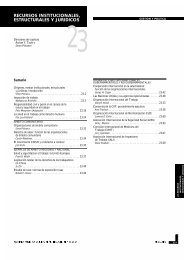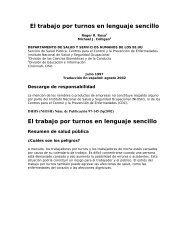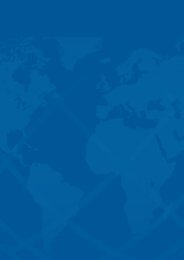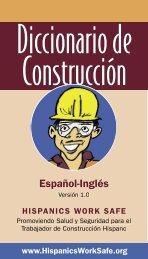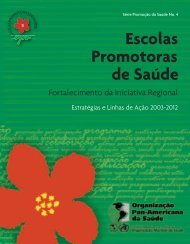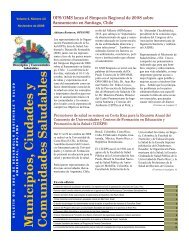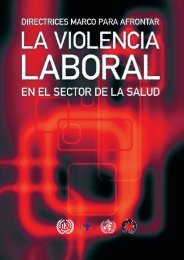Waste Not, Want Not ! - BVSDE - PAHO/WHO
Waste Not, Want Not ! - BVSDE - PAHO/WHO
Waste Not, Want Not ! - BVSDE - PAHO/WHO
Create successful ePaper yourself
Turn your PDF publications into a flip-book with our unique Google optimized e-Paper software.
Water:<strong>Waste</strong> <strong>Not</strong>, <strong>Want</strong> <strong>Not</strong> !<br />
First Saturday of October<br />
Inter-American Water Day<br />
First Saturday of October<br />
5 Octobe r<br />
2002
CARIBBEAN WATER AND WASTEWATER ASSOCIATION (CWWA)<br />
ECONOMIC COMMISSION FOR LATIN AMERICA AND THE CARIBBEAN (ECLAC)<br />
INTER-AMERICAN ASSOCIATION OF SANITARY AND<br />
ENVIRONMENTAL ENGINEERING (AIDIS)<br />
ORGANIZATION OF AMERICAN STATES (OAS)<br />
PAN AMERICAN HEALTH ORGANIZATION/<br />
WORLD HEALTH ORGANIZATION (<strong>PAHO</strong>/<strong>WHO</strong>)<br />
UNITED NATIONS ENVIRONMENT PROGRAM, REGIONAL OFFICE<br />
FOR LATIN AMERICA AND THE CARIBBEAN (UNEP/ROLAC)<br />
<strong>PAHO</strong>/<strong>WHO</strong><br />
Health and Environment Division<br />
Pan American Center for Sanitary Engineering and Environmental Sciences (<strong>PAHO</strong>/CEPIS)<br />
Lima, Peru, 2002<br />
CEPIS Director : Mr. Sergio A. Caporali<br />
Coordinator : Ms. Lourdes Mindreau<br />
Material prepared by : Dr. Eloísa Tréllez Solís<br />
Design and layout : Mr. Percy Tapara C.<br />
Edition : Ms. Marta Miyashiro<br />
PRINTED AT <strong>PAHO</strong>/CEPIS:<br />
Los Pinos 259, Urbanización Camacho, Lima 12, Peru<br />
P.O. Box 4337 - Lima 100, Peru<br />
Telephone: (51 1) 437 1077<br />
Fax: (51 1) 437 8289<br />
cepis@cepis.ops-oms.org<br />
http://www.cepis.ops-oms.org<br />
This year's theme Water: <strong>Waste</strong> <strong>Not</strong>, <strong>Want</strong> <strong>Not</strong>! was proposed by Mr. Errol Grimes,<br />
President of the Caribbean Water and <strong>Waste</strong>water Association (CWWA).
Presentation<br />
Caribbean Water and <strong>Waste</strong>water Association (CWWA)<br />
Human health and social development depend on freshwater supplies being adequate in both<br />
quantity and quality. Indeed in the Caribbean, especially in those islands that experience water<br />
shortages during severe dry seasons, this year's theme “Water: <strong>Waste</strong> <strong>Not</strong>, <strong>Want</strong> <strong>Not</strong>!” highlights<br />
the precious nature of water as a commodity and the need for its proper use and conservation,<br />
ensuring sustainability.<br />
Water and development are intrinsically linked. Once viewed as an infinitely renewable and<br />
bountiful resource, water today defines and confines development aspirations. For instance, in<br />
Trinidad, as part of its integrated approach to water resources development, the largest reverse<br />
osmosis desalination plant in the Region of the Americas has been recently constructed.<br />
th<br />
This year we celebrate a milestone 10 anniversary of the IAWD initiative and we at CWWA<br />
welcome the many new organizations joining the fold in promoting this important annual event.<br />
Errol Grimes<br />
President, CWWA<br />
Economic Commission for Latin America and the Caribbean (ECLAC)<br />
Water management is equivalent to managing conflicts among human beings and between them and<br />
their surroundings. Society must learn to live with these conflicts and to face them adequately, knowing<br />
in addition that water shortages will increase constantly due to economic growth, social demands,<br />
environment impairment, and climatic changes. Competition between users will be more and more<br />
drastic, which will require governmental participatory systems with the power to make decisions and<br />
the capacity to apply regulations for the general good of all people, so as to manage water resources<br />
with an integrated approach. For this, it is necessary to prepare and promote standards, good<br />
practices, processes, and techniques in order to disseminate them among the actors participating in<br />
water management. In general, the countries of the Region lack these guiding elements and do not<br />
have capacity building systems for integrated water management that would guide on a large scale the<br />
harmony of economic, social, and environmental goals in each river basin or territory.<br />
ECLAC maintains that today there is a crisis of governance in integrated water management matters.<br />
This is so because, on the one hand, there is an increasing number of conflicts owing to the use of<br />
water, and on the other hand, institutional systems are not preventing, avoiding, or solving them in an<br />
effective way. ECLAC, rescuing the positive advances and the application of best practices related to<br />
water management and regulation of public utilities, emphasizes in its regional work the<br />
implementation of activities oriented toward the systematization, analyses, and sharing of these<br />
experiences (political, legal, economic, environmental, social, financial, and managemental aspects).<br />
In this way, ECLAC has become one of the few, and in some issues, the only center or "clearinghouse,"<br />
that captures, processes, systematizes, and redistributes information and the one that advises<br />
governments on issues of water management and regulation of public services.<br />
Axel Dourojeanni<br />
Director, Division of Natural Resources and Infrastructure, ECLAC
Inter-American Association of Sanitary and Environmental Engineering (AIDIS)<br />
The history of humankind is marked by innumerous technological conquests, progress in<br />
relationships between people, and the creative capacity of human beings to overcome their<br />
challenges. However, from the prehistoric age until the present age, the development of<br />
civilizations has always had its passages defined through a critical factor: the presence or the<br />
absence of water. If it is present and in abundance, water represents the possibility of agricultural,<br />
social, industrial, sanitary, and quality of life improvements. On the other hand, absence or limited<br />
access to water resources leads to poverty, wars, diseases, and economic stagnation.<br />
It is precisely because water is an essential resource to life and development that AIDIS joins the<br />
th<br />
commemoration of the 10 anniversary of the Inter-American Water Day, to be held on 5 October<br />
2002, with the title Water: <strong>Waste</strong> <strong>Not</strong>, <strong>Want</strong> <strong>Not</strong>! This year, in addition to the agreements already<br />
signed between CWWA and <strong>PAHO</strong>, we have the satisfaction of also receiving the support of the<br />
Organization of American States (OAS), the Economic Commission for Latin America and the<br />
Caribbean (ECLAC), and the United Nations Environment Program/Regional Office for Latin<br />
America and the Caribbean (UNEP/ROLAC).<br />
We say no to waste, because we understand that water is a finite resource, susceptible to man's<br />
actions; the same man who needs to see that water is an essential commodity for his or her<br />
existence, survival, and progress.<br />
We say no to scarcity, because we are aware of the need of water for life, health, development, and<br />
ecological sustainability. We need to formulate new public policies to protect water resources,<br />
intensify environmental education, and forge a culture promoting the wise use of water. Today, it is<br />
only with the strong participation of all that we can guarantee our survival in the future.<br />
Carl-Axel P. Soderberg<br />
President, AIDIS<br />
Organization of American States (OAS)<br />
The topic for this year's Water Day, “Water: <strong>Waste</strong> <strong>Not</strong>, <strong>Want</strong> <strong>Not</strong>,” clearly emphasizes the<br />
economic, social, cultural, and ecological value of water.<br />
Sadly, each day we waste millions upon millions of liters of water in activities that do not recognize its<br />
value. When we misuse water, not only are we neglecting our responsibility as citizens to prevent waste;<br />
most of all, we disrespect those who live in areas where water is not available to all. Some people must<br />
live with less than 50 liters of water a day, while others use over 500 a day.<br />
Conserving water is a matter of respect for those people who do not have enough of it, and for the<br />
resource itself provided by nature. Nature has not given us water to waste it. Nature provides water as a<br />
resource. It is our duty to use it wisely, consciously, and sparingly.<br />
The Organization of American States joins with governments, and governmental and nongovernmental<br />
organizations to organize and implement integrated water management systems, enlisting the<br />
participation of local communities, regional governments, and countries. Raising awareness of the<br />
importance of water and of ways to use it sparingly and respectfully is part of this process.<br />
The results of our efforts can already be seen. Each day we see new initiatives geared toward<br />
discussion of problems and possible solutions to ensure an adequate supply of safe water for all. Still,<br />
we have a long and difficult road to walk before we meet our objectives.<br />
“Water: <strong>Waste</strong> <strong>Not</strong>, <strong>Want</strong> <strong>Not</strong>” is a call to every citizen to contribute to this effort.<br />
Richard A. Meganck<br />
Director, Unit for Sustainable Development and Environment, OAS
Pan American Health Organization/World Health Organization (<strong>PAHO</strong>/<strong>WHO</strong>)<br />
Water is a fundamental good. Many consider that it is boundless since it is part of nature's cycles. Its<br />
abundance, however, is neither so certain nor imperishable.<br />
Despite fulfilling an important role for health, agriculture, industry, and life itself, water is often<br />
underrated either because we waste it or because we do not duly take into account its treatment costs.<br />
This 2002, upon completing ten years of the Inter-American Water Day initiative, we feel doubly<br />
committed to the IAWD objectives and with this year's slogan that emphatically says, Water: <strong>Waste</strong> <strong>Not</strong>,<br />
<strong>Want</strong> <strong>Not</strong>! We trust that this slogan will promote the active participation of different social actors,<br />
especially local authorities, educators, communicators, and the community to bring about better<br />
practices of water consumption day by day.<br />
This year is special for our Organization since we celebrate 100 years of service to international health.<br />
Our efforts serve men and women who speak French, Spanish, English, Portuguese, as well as native<br />
tongues, all of which are united in the Region by the same dream: improving our quality of life,<br />
expanding our opportunities, and diminishing inequity.<br />
For this reason, we exhort our friends to stop and think what would happen if all of a sudden we do not<br />
have water at all. What would happen in our houses, our neighborhoods, our cities, and fields? How<br />
would we face such situations? The best response is to start the rational use of this vital resource,<br />
understanding its finiteness and vulnerability and, above all, that its availability depends on how we use<br />
it today.<br />
Mauricio Pardón<br />
Director, Health and Environment Division, <strong>PAHO</strong>/<strong>WHO</strong><br />
United Nations Environment Program/Regional Office for Latin America and the Caribbean (UNEP/ROLAC)<br />
Our water resources are put under intensive use due to agricultural production and urban and<br />
industrial development. The Region of the Americas has important water resources, but we must<br />
understand that they have an unequal spatial distribution. That is to say, there are regions with lots of<br />
water, but scarcity in others. This must be taken into account when planning the development of<br />
societies and their economic activities. In addition, it is important to study the dynamics of river basins<br />
so that they do not affect people living downstream, as is the case of coastal zones where more than<br />
60% of the worldwide population live. It has also been recognized that 70% of marine and coastal<br />
deterioration is produced by mainland activities, such as wastewater disposal and the construction of<br />
dams upstream of the river basin.<br />
The Regional Office for Latin America and the Caribbean of UNEP enthusiastically joins the Inter-<br />
American Water Day initiative to promote water resources protection for the benefit of human health<br />
and ecosystems. Water: <strong>Waste</strong> <strong>Not</strong>, <strong>Want</strong> <strong>Not</strong>!<br />
Ricardo Sánchez Sosa<br />
Regional Director for Latin America and the Caribbean, UNEP/ROLAC
Contents<br />
CHAPTER 1<br />
CHAPTER 2<br />
CHAPTER 3<br />
CHAPTER 4<br />
THE ECOLOGICAL VALUE OF WATER<br />
Concepts<br />
The Presence and Influence of Water<br />
The Water Cycle<br />
THE ECONOMICAL VALUE OF WATER<br />
The Diamond-Water Paradox<br />
Environmental Goods and Services<br />
Costs and Tariffs<br />
THE VALUE OF WATER FOR HEALTH AND<br />
OUR RIGHT TO WATER<br />
The Right to Water<br />
Water and Diseases<br />
Integrated Health<br />
WATER AND ITS CONTRIBUTION TO SUSTAINABLE<br />
HUMAN DEVELOPMENT<br />
Water, Part of the Environment<br />
Sustainable Development and Water<br />
Page<br />
2<br />
3<br />
4<br />
10<br />
12<br />
13<br />
16<br />
17<br />
18<br />
22<br />
23<br />
CHAPTER 5<br />
AVAILABILITY, SHORTAGE,<br />
AND WASTE OF WATER<br />
Availability<br />
Shortage and Water Crisis<br />
Water <strong>Waste</strong> and Consumption<br />
30<br />
31<br />
34<br />
CHAPTER<br />
6<br />
SAVING WATER: A GUARANTEE FOR LIFE<br />
AND DEVELOPMENT<br />
The Habit of Conservation<br />
Conservation and Good Habits<br />
Maintenance and Review of Productive Processes<br />
40<br />
41<br />
42<br />
CHAPTER 7<br />
CELEBRATING 10 YEARS OF THE INTER-AMERICAN WATER DAY<br />
(IAWD) INITIATIVE<br />
The IAWD Commemorates 10 Years<br />
Achievements and the IAWD Portal<br />
International Coordinating Group (ICG) and<br />
National Coordinating Groups (NCG)<br />
Water Flagship Country and the Water Friend Award<br />
48<br />
49<br />
50<br />
51


